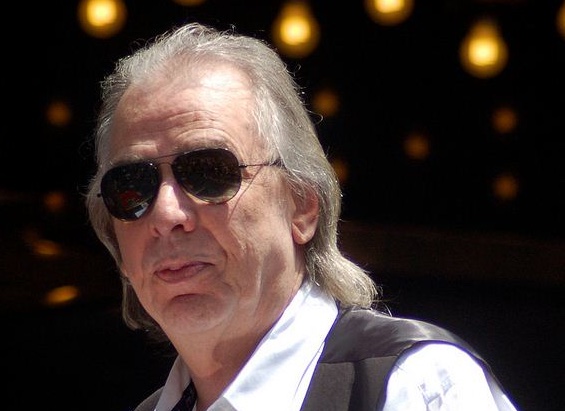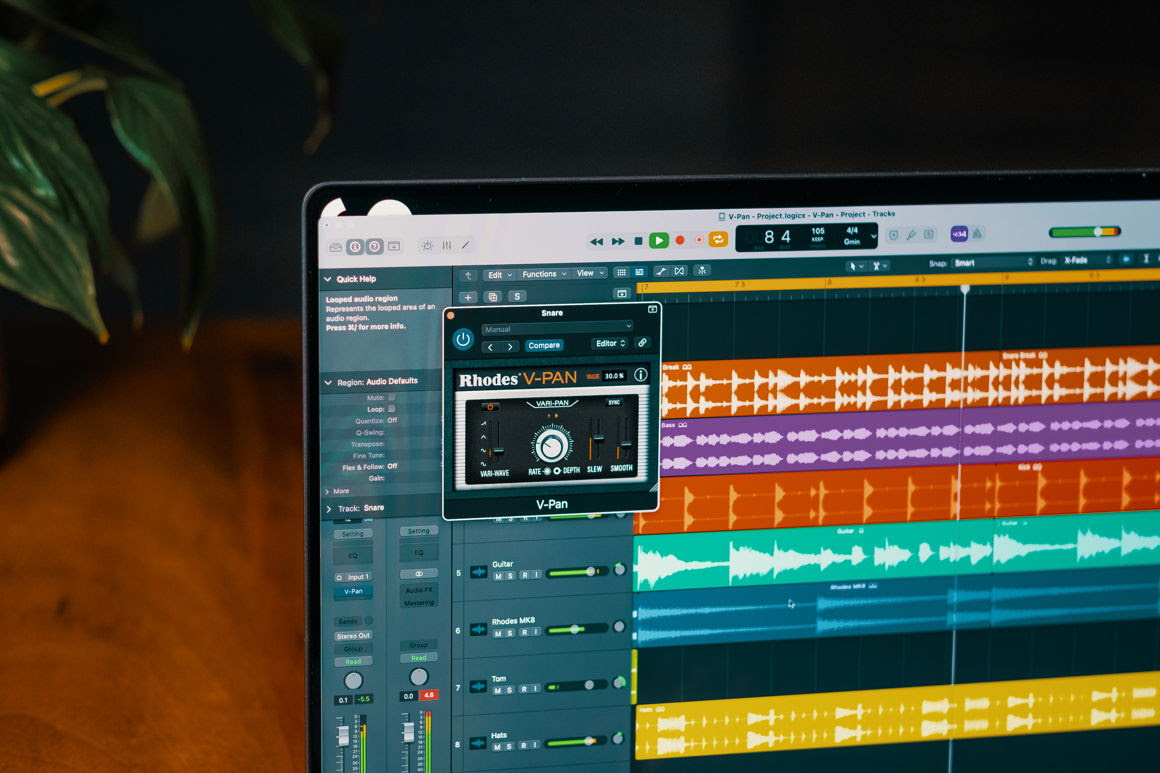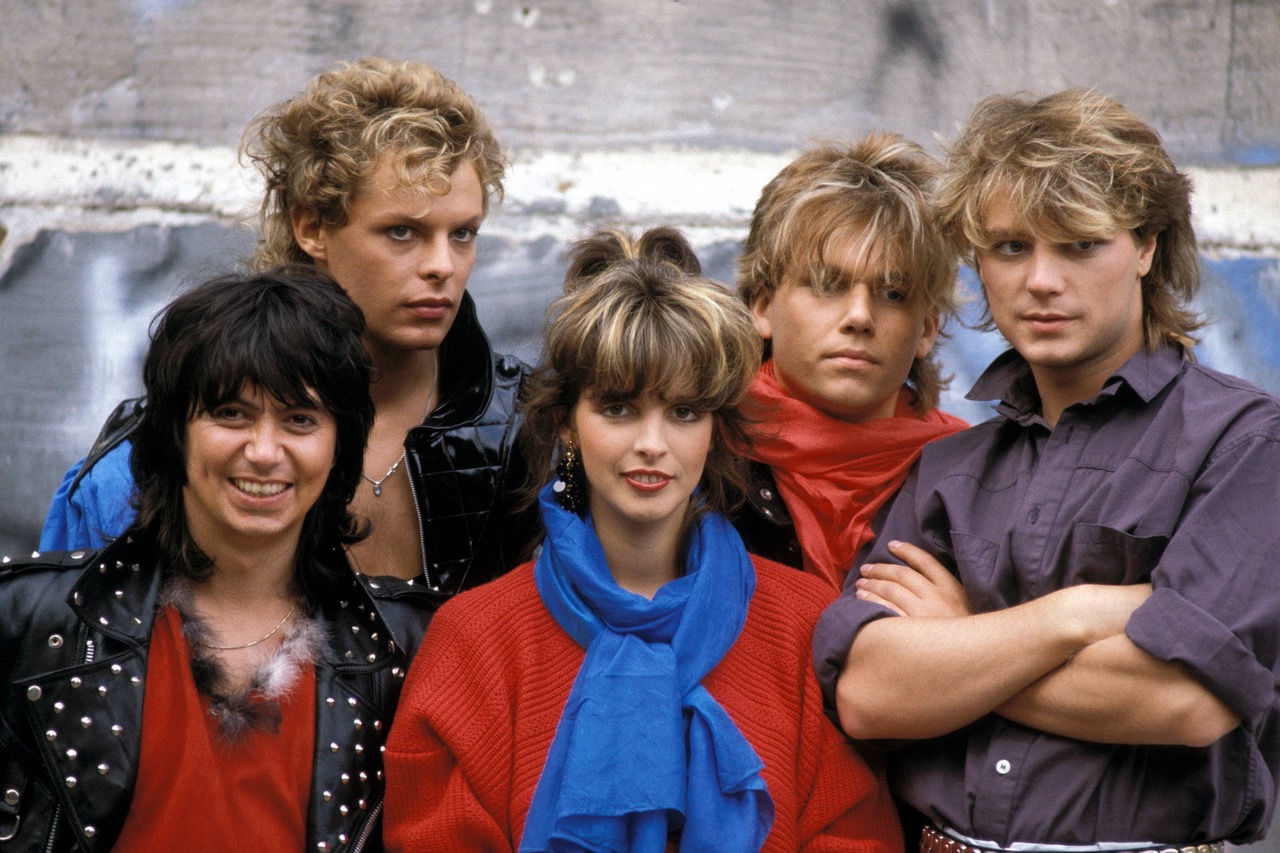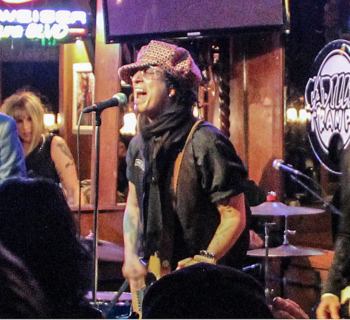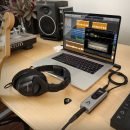You can't trace the history of FM rock radio without encountering Jim Ladd, one of its most energetic and passionate progenitors.
From the moment he encountered the microphone for the first time, Jim has focused his energy on entertaining and communicating via the FM airwaves. Never at a loss to combine meaningful music with substantive social and political issues, Jim has earned a well-deserved reputation as both pioneer and on air personality.
Ladd is a longtime fixture on KLOS-FM (95.5) Monday-Thursday 10:pm to 2:00 am. Sunday 9:00 pm-12:00 am.
Born in Lynwood, California, Ladd landed his first on-air assignment in 1969 at radio station KNAC-FM in nearby Long Beach.
Ladd has been heard on the Southern California radio airwaves for over 40 years. He held an initial stint on KLOS-FM (95.5) 1971-75 that was then followed by a venture to a floundering yet stimulating maverick station, KMET-FM.
Within a year KMET became the#1 rated station in Southern California; in fact, for eight of the nine years he spent with the station, Jim was the #1 rated air personality in his time slot. These were the glory days of FM rock radio and KMET was the very pinnacle of the medium.
Ladd subsequently returned to KLOS-FM 1985-86, moved to KMPC on the AM dial from 1988-89, an audio residency at KLSX-FM 1991-95, before rejoining KLOS- (95.5) FM again in 1998.
Jim has been the #1 rated nighttime rock personality many times in the 1998-2009 period in all of Southern California. In spring 2010, Ladd’s KLOS program still has the current #1 show at night.
He’s also contributed mightily to the resurgence of every station at which he's worked.
Jim first garnered national prominence as host of the hour-long nationally syndicated radio program "Innerview,” which aired weekly on over 160 stations nationwide for twelve years. Jim has done in-depth pieces with almost every major rocker in the music world, including: John Lennon, Alice Cooper, Pink Floyd, U2, Grateful Dead, Joni Mitchell, Stevie Nicks, Crosby Stills Nash &Young, The Eagles and Led Zeppelin.
In 1987, he accepted the invitation of Roger Waters (a founding member of Pink Floyd) to take part in the making of his solo album, “Radio K.A.O.S.” Playing himself as a rebel DJ on the album, Jim was also a featured performer on Water's highly touted world tour, as well as starring in all three MTV music videos.
Jim served as co-host of DIR Broadcasting Corporations' nationally televised pay per view concerts, which included The Who's history making 25th anniversary performance of "Tommy,” broadcast live from the Universal Amphitheater in Los Angeles.
In June of 1990, Jim flew to England to co-host the Westwood One world wide radio satellite broadcast of "Knebworth 1990," an eleven-hour outdoor festival featuring Paul McCartney, Robert Plant, Jimmy Page, Phil Collins, and Pink Floyd.
Ladd was part of another truly historic moment in rock that year, as co-host for the Global Satellite Network's radio broadcast of “The Wall in Berlin." The largest theatrical rock event ever staged, it played to 300,000 people at the Berlin Wall, and was seen by a world wide television audience of over a billion people.
Jim’s vocal work has also been utilized in major motion pictures such as: “Tequila Sunrise," “Rush,” "She's Out Of Control" and "Say Anything.” And more recently, provided a voice over for The Doors’ documentary, “When You’re Strange.”
In June of 1991, Jim Ladd published his first book entitled: “Radio Waves. Life and
Revolution on the FM Dial” (St. Martin's Press). A candid, revealing, behind-the-scenes account of a life in FM radio, “Radio Waves” was released in paperback in May of 1992.
In August of 1992, Jim was the host for the worldwide broadcast premiere of
Roger Waters long awaited solo album "Amused To Death," live from the studios of Q107 in Toronto Canada.
Ladd then went on to write and host “Headsets,” a series of nationally syndicated weekly radio specials for the Global Satellite Network. In addition, Jim went on to host the nationally syndicated television show “The Extremists,” a weekly program featuring profiles of the worlds most extreme athletes.
Jim was honored by being nominated by both “Radio and Records” and “Billboard” magazine, as “Rock Radio Personality of The Year for 1998.”
On November 21st 2000, Jim Ladd was named “Air Personality of the Year” by
The Los Angeles Music Awards.
This decade Jim was honored when Tom Petty and The Heartbreakers released their album “The Last DJ” where Jim is credited as being the influence for the central character in the title song.
On May 6th 2005, Jim Ladd received a star on the Hollywood Walk of Fame in recognition for the first thirty-eight years of his ground breaking radio career.
In 2007 on February 2nd Jim was recognized for his contributions to broadcasting when he received the Media Arts Award from the Hollywood Arts Council.
Jim Ladd and Harvey Kubernik interview
Q: What song or band made you want to go into radio?
A: I was watching “The Tonight Show” when John Lennon and Paul McCartney were the guests in late 1967 or ’68. The regular host Johnny Carson was not on and his substitute was Joe Garagiola. His first few questions were, ‘How come they call you guys the mop tops? ‘Why do you grow your hair long? Which one is Ringo?’ He was so clueless. I loved Joe when he called sports and earlier was a baseball player. His questions impacted me to the point I was so pissed off. I didn’t know anything about media but I could recognize that you are blowing the chance of a lifetime. I’ve got questions for these guys. I want to hear what John Lennon and Paul McCartney has to say. So that impacted me a great deal and I swore that something should be done about that. And years later I got to start ‘Innerview.’
“The other thing is The Beatles and The Doors. I always put The Beatles on their own shelf. But The Doors are the ones who really walked me into the rock ‘n’ roll lifestyle.
“Their first album twisted my brain. I can visualize in my mind, I had been in the hospital with tuberculosis and I had gotten out after four months of isolation. I walked into my friend’s hippie apartment. I can see the turntable in my mind, and I’m listening to ‘Back Door Man.’ And I went, ‘Whose that?’ And he said, ‘It’s a new band called The Doors.’ I sat down, lit up a joint and kept putting the album on over and over. I could not stop listening to it. Of course, when I got to ‘The End,’ that was it for me.
Q: You saw The Doors play live in 1970 at the Long Beach Arena. You still talk about it on the radio on occasion. You have never recovered from that experience.
A: I was waiting for that show. I was working at KNAC-FM. My mind was blown completely, and by that time they were doing ‘Morrison Hotel.’ I had been a Doors’ fan since the first album but never saw them. And I went there. This was the days before special effects, pyrotechnics. There was none of that. It was just this band on stage. And they were completely and utterly mesmerizing. It was also, to this day, the tightest band I had ever seen. Right before me, and I thought at the time I knew how to do a segue. They did a medley that would go from one song to another. And until Jim (Morrison) started singing, I didn’t realize it. They were that good.
Q: What were you like as a teenager?
A: I kind of was rutterless until The Beatles were on ‘The Ed Sullivan Show.’ And the moment that happened I knew I wanted to be involved in music.
“I was in a band right after I saw The Beatles. A garage group. The English invasion blew my mind. Once I viewed The Beatles on ‘Ed Sullivan’ that moment my life changed. That was it. I went from listening to The Beach Boys to holy crap! ‘Something is really different now. The world has changed.’ There was not a lot of music in my house. I’d listen to The Beach Boys but then The Beatles, The Rolling Stones, The Jefferson Airplane. John Hammond, Jr.
“I’m at my parent’s house, listening to this brand new thing called FM radio. A station called KMPX that I am tuning in from San Francisco. I hear ‘Back Door Man.’ And the DJ says, ‘That was John Hammond. Thank you.’ I was so taken with it I got in the car and drove up to Berkeley and found a record shop across the street from U.C. Berkeley and said, ‘I’m looking for this blues singer named John Hammond.’ ‘Oh yeah. We got him.’ So I go over to the record bin and the only thing I can find is this thing called ‘Big City Blues.’ But it’s a white guy leaning up against a motorcycle! In a leather jacket who looks like Mick Jagger’s younger brother. So I go up to the clerk, ‘Hey. I’m looking for a blues singer.’ I thought he had to be black. So, that’s how I got into the blues.
“I had grown up on AM radio. KHJ, KYA. But this new FM radio thing was different.
I am hearing albums and bands I had never heard of.
Q: Did you want to be a DJ? Was there a plan?
A: There was no plan. I wanted to be in a band. I thought I was going to be a cross between Jim Morrison and Bob Dylan. The problem is, I can’t sing. (laughs). God let me talk. He did not let me sing. And one day when I was driving to a band rehearsal, smoking some hash with a guy in the band, he says to me, probably because he wanted me to stop singing, ‘you know, you have a great speaking voice. Have you ever thought about being in radio?’ Never thought about it.
“Next thing I know I go to Long Beach Community College and took a class in radio and television communications. And I immediately fell in love with it. I liked doing it and seemed to have some sort of aptitude to do it.
“In 1969 I’m living in a commune in Long Beach, directly across from the ocean in Crab Hollow, right down the street was KNAC. So I started to go there. And a guy, the late Don Bunch, was kind enough to kind of let me come in, empty the ashtrays, file records and hang out. It was a MOR (middle of the road) station. But at night they let him do rock. The station told him, ‘They are gonna do this underground radio thing. So get me an audition tape.’ So I said, ‘what’s an audition tape?’ So he explained to me what it was. I cut the audition tape and I’m sure, based on the fact that I had long hair, I was hired. Because they were gonna take the station to 24 hours of underground music. I got $1.65 an hour.
Q: Did you know at that moment there was more to being a DJ than time, temperature and announcing the records?
A: Immediately. I got the idea, from listening to other people, that I could take these songs and combine them in a way that would say something. That would tell a story that would be a narrative. And that’s what I started to do almost from the very first night.
Q: Did you then or even now, have a philosophy about doing radio?
A: The only philosophy that I promised myself and I try to stick to it this day, is give it everything I have every night. And to try and do something positive. Because I look at myself as being really lucky. Really fortunate. Don’t take it for granted. And you better go in there and deliver. When nowadays it’s even more important because it is the last free form show. So there's a lot of weight on me. If I’m gonna go into the station then that show better rock. And I better not phone it in.
Q: How does your nightly radio show come together?
A: I usually get up about 1:00 in the afternoon. I eat my first meal at about 5:00 or 6:00 and go to work. I come home and eat my second meal of the day and go to sleep around 5:00 am in the morning. ‘Cause it takes a long time to wind the adrenaline down.
“Usually on my drive into the radio station that is where I think about what song I will play first. That’s always important and it sets the tone of that night’s show. What do I want to start with? Sometimes that will change 4 minutes before I go on air. I usually have an idea.
“The nightly show I never do anything in advance. A blank sheet of paper at 10:00 pm. It’s all stream of consciousness. All live and I’m my own engineer. All the mixes are live I’m doing. I play vinyl. I play mp3’s
“The preparation work comes in when I am going to interview somebody. That’s where the homework comes in. I spend an inordinate amount of time doing preparation for the interview.
Q: Where did the “on air editorial” raps begin that are woven around the music?
Like when did this social messenger aspect of your radio work emerge?
A: It came from, and it is to this day, the Sixties ethic. Coming of age during the era of Dr. Martin Luther King, Jr., the Vietnam war protests, the women’s rights movement, gay movement, the movement to legalize marijuana, concerns about the environment. If you were in the Sixties, and you were serious about what was going on and paying attention, it became part of your person. Not your professional person. You as a human being and you had to be involved in the world.
Q: I remember 1972-1974 you were constantly discussing the Watergate crisis and those government hearings on the radio airwaves. Was that a tipping point for you to veer more into this political arena?
A: I saw Watergate as a direct threat to the constitution and America. It pissed me off. It also, by the way, I thought was one of America’s finest moments. Because watching the Watergate hearings, watching Richard Nixon, the President of the United States have to resign without a military coup, taught me that when push comes to shove, the constitution works. That was also a proud moment in American history.
Q: You have had some run-ins with station management over the decades.
A: I’ve been told to shut up constantly. I was hauled in to the General Manager’s office at KMET and threatened I would be fired if I mentioned paraquat and the spraying of it on Mexican marijuana fields.
“I was against the spraying of paraquat on marijuana fields. The other DJs as well. We ignored it and went about our business. And our business was to protect the listeners who may get a hold of some of this stuff and ruin their health.
“I first heard DJ Pat “Paraquat” Kelley in the afternoon in a news report, and by the time I got to the station, there was a thing in our log book about writing our Congressman. A public service announcement. The program director was on our side.
“So I went on the air and read it, played an appropriate song, the request line rings, and the guy says, ‘You know what Jim? Rather than telling people to write to Congress, why don’t you have them call the White House.’ There was a public telephone line open 24 hours a day. I called the number and got the White House. I then announced later, ‘At midnight tonight, 3 in the morning in Washington, D.C., I’m going to give out the telephone number of the White House.’ We politely called them in masse to protest the spraying of paraquat on Mexican marijuana fields. This was the KMET audience.
Q: All through the 1970s, especially around the music, record business, and FM radio stations, marijuana was around the environment.
A: It was part of our culture. It was part of our daily life and routine. We smoked in the studio and on the air. In fact, when we moved into some new studios at Metro Media Square, Rachel Donahue, another DJ, God bless her, had the station with the architects build a vestibule that went between the air studio and the music studio. That was strictly a place where we could go to step in and light up. And they built it.
Q: I know we’re going back over 30 years, but did smoking marijuana impact or inform your radio work?
A: I don’t do this anymore, but back then I’d have a little ritual and go in and do the first half hour of the show and get my legs on the ground. And then I would go out and take a hit or two of pot and do the rest of the show. In the KMET days, a lot of people did it. Some had it. And it was part of the culture.
“I also don’t have crazy stories about record company promo people leaning on me to play songs. I got a reputation really early that you don’t come and talk to me about your records. You certainly don’t come and talk to me if you are offering me something. The reason is that because I took this so seriously about my job.
“And, if I’m playing a Bob Dylan song and my audience has to know I’m playing that song because of what it says. And for no other reason. So I never got any of that because I let it be known really quickly that the only reason I ever choose a song is because the song is advancing the set that I’m playing. I do not want any other thought in my mind except what is that song saying.
Q: Do you remember your first joint?
A: I do. I have a good story about that. I was in an apartment in Northern California, still living at home. I went over to this apartment to smoke my first marijuana cigarette. Somebody had one. We locked the doors, pulled the shades, went into the bedroom, so paranoid the cops would be busting in on this one little joint. We put on the album ‘Freak Out’ by Frank Zappa and The Mothers of Invention. Oh man…
Q: And many years later, Zappa is a neighbor of yours in Laurel Canyon and you talked to him a few times for your longtime “Innerview” series.
A: I went over to see Frank. I was in his house. He was a very bright guy. You really had to have your guns loaded. On that day, maybe the early ‘80s, it was common that I would pull out a joint and ask who ever I was interviewing if they wanted to smoke a joint. And Frank said, ‘I don’t do drugs. I don’t want drugs in the house. I have children here. What are you doing bringing drugs in my house?’ It completely put me back on my heels. I said I was sorry. It was his policy. I went back to my car put it away and did the interview. He thought that was cool.
Q: How has FM radio changed the last 40 years?
A: That’s a big question. The answer is it began in April of 1967 when Tom and Rachel Donahue walked into a radio station in San Francisco that was so poor it could not pay its phone bill. They had an idea. They brought in their own albums. And from those humble beginnings a multi-billion dollar industry grew out of it. It went from people who did it strictly for the love of the art form, who saw that we needed a connection between the activists on the street, the musicians who were signing the songs about the issues the activists were doing, and we needed a way to combine those two things and broadcast it to the tribe. That’s where we came in. A lot of it was going to be fun and about parties. A lot of it was going to be serious about ending the war. The 45 single gave way to the album. The single might be a nice catchy love tune but on the album you might find a song about ending the war.
“The nice thing about rock ‘n’ roll is that you can give me any subject you can think of that has to do with life and I’ll play you a set about that. Because rock ‘n’ roll has talked
about it. Unlike swing or country music, rock ‘n’ roll deals with life, religion, sex, drugs, everything you can find. That’s where I was able to take a subject that was in the news that day that disturbed me, come on the air and talk about it and then play four or five songs that would expand the discussion.
Q: In 1980 the government voted to de-regulate the airwaves. There used to be a limit on how many radio stations a company could own. That changed. How did the new conglomerates, corporations and the expanded ownership impact radio then. The ramifications of this are still evident in 2010.
A: We were the canary in the coal mine. That was the worst thing that ever happened to FM radio and American media as well. Prior to President Ronald Regan, for the entire history of American broadcasting, going back to radio inventor (Guglielmo) Marconi, as soon as there was a Federal Communications Commission, they had what was called the 7 and 7 rule. That meant that one person or corporation could not own more than 7 radio and 7 TV stations. That’s all you could own in the country.
“Then Ronald Regan comes along and has the brilliant idea of de-regulating radio. Now this came obviously from the lobbyists who got to the legislators.
“And after Regan, and by the way, also President Clinton, who is to be held accountable for this. It was instead of American media and the airwaves being looked upon as the public trust, the public’s airwaves, it now became all right for large corporations to buy up as many radio and TV stations as they can get their hands on. And that is where the threat to the first amendment comes in because fewer and fewer people own more and more information outlets.
Q: Is it harder now to do your own thing on the radio?
A: It’s a great question and the answer is a definitive yes. Because every night when I go in I am very aware that this is it. Because I’m the one carrying the torch. Now I didn’t ask the carry the torch. I just looked up one day and I was the last guy standing. So I’m really aware of that. One of the worse things that happened because of de-regulation was initially they didn’t give a shit about us. But once we started making money that’s when it got serious for the owners. They brought in consultants and these people who didn’t care about the music.
Q: Who is your nighttime audience? Years ago, and in 2010?
A: During the KMET era the audience was virtually the same age as me. People sat and really listened to the radio and followed along. And I knew whom I was talking to. As FM aged, and the audience aged, they got married, got mortgages, and now, thank God, I have those same people listening. Now they may not be able to give me as much time as they did then. But here's’ the kicker. Their kids are now listening. That is something I never thought I would live to see. A parent and a child would listen to the same music. That blew my mind.
“5 years ago, a guy in a car called up with a request. And he said, ‘I’ve got my son who is 16. He wants to hear some Jimi Hendrix.’ I still have many people that call me who have been listening since KNAC. Now that’s extraordinary. I also have kids who are 16, 17 and 18 requesting Bob Dylan. That’s even more extraordinary. They know who The Beatles are and know their music inside and out. They love The Doors.
Q: Why do your listeners constantly demand The Beatles, Doors, Led Zeppelin, Rolling Stones, Tom Petty, Neil Young and U2. Like, why after 40 years they keep requesting a lot of the same bands that are always a part of your sound rotation?
A: Because the music is that good. They wrote extraordinary songs that speak to people in a way that pop music does not. The Doors get inside of you. The Beatles get inside of you in a way pop music doesn’t. The Rolling Stones’ ‘Gimme Shelter.’ The difference with these guys is that they have a way of writing a song that became popular but at the same time it’s talking about breaking on through to the other side. ‘Not To Touch The Earth.’ ‘Ship of Fools’ from ‘Morrison Hotel” which talks about the human race dying out. This is stuff that is still applicable today.
“A kid hearing The Doors’ ‘Peace Frog’ in 2010 for the first time is going to hear it different than I did because the Vietnam War is not raging. Or the 1968 Democratic Convention with people being beaten up in the streets. However, they are going to hear it in the context of their world. I can’t presume to know what that means. Today I can play that song in the context of today and make it work. So it is still relevant to me because even though it was written back then I can put it together with something new.
“The only thing today’s kids are missing is context. I have to keep in mind that the songs says something to me but it may say something completely different to someone in the audience. So all I can do it is play it in a way that says something to me and then how it is interpreted by them in the context of the set it may be different. If I put the songs together correctly people should recognize, ‘OK. Morrison is saying something in ‘Five To One.’ That’s why you have to listen to the lyrics when you listen to my show.
“Years ago, the recordings of ‘Helter Skelter,’ ‘Peace Frog’ and ‘Gimme Shelter’ were warnings and they are reality now. Sometimes the particular or current issue drama will change but the human condition that causes them is the same. The thing that caused war in Vietnam or war in Iraq is war.
“I have a lot of conservatives that listen to my show and I’m proud of that. I’m proud of the guy who comes up to me, and this has happened more than once, ‘Jim, I’ve been listening to you for more than 30 years and I’ve never agreed with one thing that came out of your mouth about politics. But I’ve listened for 30 years.’ Fantastic. Because we’ve reached some sort of dialog even though he’s a conservative and I am a liberal. I support Barak Obama. He’s only had a year. Look what he walked into.
“You really have to understand that when I go after a specific topic like war, it’s about the policy of it. Not the soldiers. Of course I support the soldiers. Who wouldn’t support the soldiers? Thank God they are fighting for us.
Q: And you still play The Doors’ “Unknown Soldier.”
A: It might be more potent now because if you listen to that song it is written about a person, and that person’s war. So it’s any soldier at any time. Not just the Vietnam war. And when he sings ‘It’s all over. The war is over’ at the end. That’s because the soldier dies. And so for him, war is over. So that applies to any soldier in harm’s way.
Q: In summer of 1971 you announced the death of Jim Morrison.
A: I was at my parents when I got the word. So I went on the air and we were mourning his death when the story broke.
“The one I remember most vividly is the passing of John Lennon. I went on the air that might and it was one of the most painful things I ever had to do. That was the most painful and memorable. To this day I have never spoken the names of the ass hole that killed him.
Q: Do you become the messenger when you have to announce deaths or traumatic events?
A: It’s not easy. It ain’t fun. You have to understand, like in the case of Lennon, KMET-FM instantly became the public wailing wall. When George Harrison passed recently, KLOS-FM became the public wailing wall. People were calling, first off, to hear it wasn’t true. And then they want spill out their emotions to you. And tell you how much they love John or George. When they first heard The Beatles. You have to be ready for that while you are doing the show and create this thing. They need to say it to somebody. And you happen to be the person because you are playing all this Beatles’ music.
“These are songs that spoke to us in a very metaphysical way. And continue too. That’s the key point. This isn’t dated music. Because they didn’t write the trendy shit. They were writing about the human experience. ‘Eleanor Rigby’ today will move somebody to tears. Even though it was written and not done in the context of time. I can play The Beatles or Doors and out it together with something new like U2 or Kings of Leon or Green Day. And make it work today. It’s not dated.
Q: How does advertising, sponsors, and promotions get integrated into your program?
How do you incorporate these factors. The people who buy time.
A: At some point you have to come to the understanding that those commercials are paying my salary. They are also keeping the lights on and paying everyone’s salary. I have a much better relationship today with the sales staff than I ever had before. For one thing, the sales department are hipper than they used to be. They used to be a bunch of used car salesmen. Nowadays the sales staff grew up listening to radio. They appreciate the songs more, and they are bit more in tune to the ethic of the show. I try and work with them more than I used too. Now you realize they are doing a job to keep me on the air. So I’m trying to do what I am. Commercials have to come up at a certain time. Because KLOS has two breaks an hour, so I’m going to play around a half and hour of time and plan out a set I can get maybe two sets of songs or one really long set.
“Back in the day it was prevalent for long songs to be played. I still do it. You don’t hear anyone else doing that. We all used to do it back then.
“Every song that I chose, every segue that I do requires a multitude of decisions. Every time I play a song. I have to know what the song is going to say and will it advance the topic.
Q: You program different length records and tempos for the mix.
A: How does the song I am playing now end? Cold, fade out. How does the next song start? If it ends cold, and the next one fades up that ain’t gonna work. If it starts really loud and the other one is fading out, that ain’t gonna work. So I have to find songs that segue and have the lyrical content. And how long are they?
A: Here is what I do. Think of me as a musician who plays a guitar, It starts with a note. And those notes build a chord. And the chords build a song. I use completed songs in the same way.
“After midnight I might go into AC/DC, then Joni Mitchell or Bob Dylan. Because the show has to have dynamics. Peaks and valleys. You do not want to be slamming heads for four hours. Maybe a Friday night more so. I want the show to take you to an emotional high, bring you down and contemplate the world for a moment. Think about the girl you lost or the one who got away. I’ve had hour discussions about God. The Rolling Stones have so many biblical references. Listen to ‘Beggar’s Banquet.’
A: I play them a lot. When they first came out I was at KMET. They were a new band. Second album came out and I was doing ‘Innerview’ at the time and needed a band that week. So Bono and The Edge came up to my house in Laurel Canyon, sat in my front room and I interviewed this new band. Which I knew very little about. But looking into their eyes I could tell these guys were the real thing and they were going to be around. And I was proven right. Bono, U2 as a band, and Bruce Springsteen, these guys are so heroic in the context that they could be sitting by the pool doing the best drugs in the world and never give a shit about anything. Yet they choose to do what they’ve done. I think they have not gotten anywhere near the due that they should with being the kind of people they are. I think these are great human beings. U2 fits right in.
Q: Neil Young.
A: For one thing, Neil Young never put on the spandex. He has been Neil Young from Buffalo Springfield to today. And he has followed his own path. He is his own man. He writes from the heart.
Q: Jackson Browne
A: He walks the walk and is so quiet about it. No one has done more benefits than Jackson Browne or Bonnie Riatt. Maybe CSN&Y. They do their business of making the world better.
Q: Led Zeppelin.
A: First off, they are probably the most popular FM rock act ever. They are that good. Listen to the music. I go deep catalog with them. The people who are in to be trendy or celebrities they don’t last. It’s the real musicians who last. Because they are really delivering. Zeppelin delivers on all those levels.
Q: Tom Petty
A: Again the songwriting. Tom Petty & The Heartbreakers are one of the best bands I’ve ever heard on record or live. They are just that good. Benmont Tench, Mike Campbell, Tom Petty. They are some of the best musicians on the planet. That’s why they are asked to play on other peoples’ albums. I liked Tom Petty from the first album. It got to me at KMET. And I play ‘em every night.
Q: The Pretenders.
A: They always had an edge to them that I liked. Chrissie Hynde is always edgy and takes on subjects I’ve never heard before. I think Chrissie has a lot of guts.
Q: Bob Dylan.
A: Bob Dylan is the greatest wordsmith ever. End of discussion. The unique interpretation of how he delivers that is one of a kind. The songs are so good they are covered. Think of all the people who covered his songs. Because that’s how good those songs are.
“When Dylan renounced being a protest singer and the voice of our generation. That hurt me and a lot of people. Now I know that was the smartest thing he ever did. Because if he hadn’t done that and gotten pigeonholed as a protest singer, we would have never gotten ‘Shelter From The Storm,’ ’Lady Lady Lay,’ or ‘The Groom’s Still Waiting At The Alter.’ He is so much smarter and more ahead of the curve than any of us. We just didn’t get it then.
“I’m an artist. That’s what I try to do as well by his example. I don’t want to get stuck in the past. KMET is one of the proudest moments of my life but I don’t want to live off that story. I want to live off the show I did tonight. And the show I’m gonna do tomorrow. That’s where I live.
Q: You have hosted a blues hour.
A: I have a show on Monday called “Mojo Monday” and the first hour of the show every Monday is an hour of the blues. Muddy Waters, Willie Dixon, John Hammond, Paul Butterfield Blues Band, The Allman Brothers.
Q: You bring up global warming and potential nuclear destruction on your shift on occasion. You’ve also touted documentaries by Albert Gore and Michael Moore to the listeners.
A: I love Michael Moore. I believe that we should support those who are doing good work. It’s hard to do good work. It may look all glamorous but I don’t even want to think about the death threats he gets. I don’t even want to think about the negative stuff. I get bad stuff but yet he is doing brilliant work and should be supported.
Q: Is it too late to save the planet?
A: We are in the process of waking up. In the very nick of time. We are catching up. Here’s the problem. The people that the establishment calls the environmental kooks turned out to be right. We’re the ones who turned out to be right. That happens a lot in social movements. I supported Earth Day in 1970 and encouraged recycling. Others embraced it like (DJ) Cynthia Fox has always been a huge community force. She just doesn’t read the PSA she goes out there.
“The news is out thanks to the internet. It takes a long time for big corporations who are started to build hybrid cars. Light bulbs that take less energy. Those of us who have been in the environmental movement for a long time are finally seeing it. We’ve been talking about it for 40 years. The point is never mind their motivations. Even if it’s just to make money or have a good PR campaign. As long as they are helping the planet then do it. Get it done. What we have to do sometimes is show these guys how they can make money in green. How do you make money and at the same time make the world a better place? That’s what we need to do. Make more money by being green. But do it.
(Photo by Angela George/Wikicommons)

